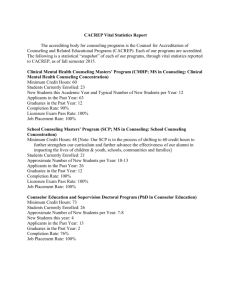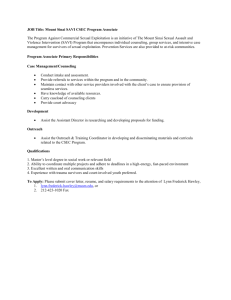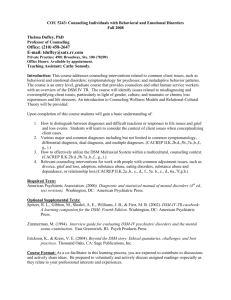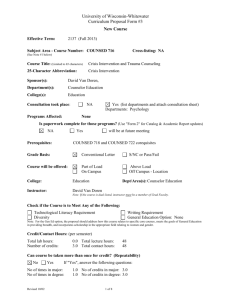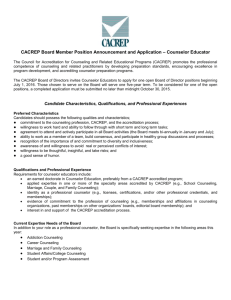2.2.2. COUN 640 01 Human Sexuality
advertisement
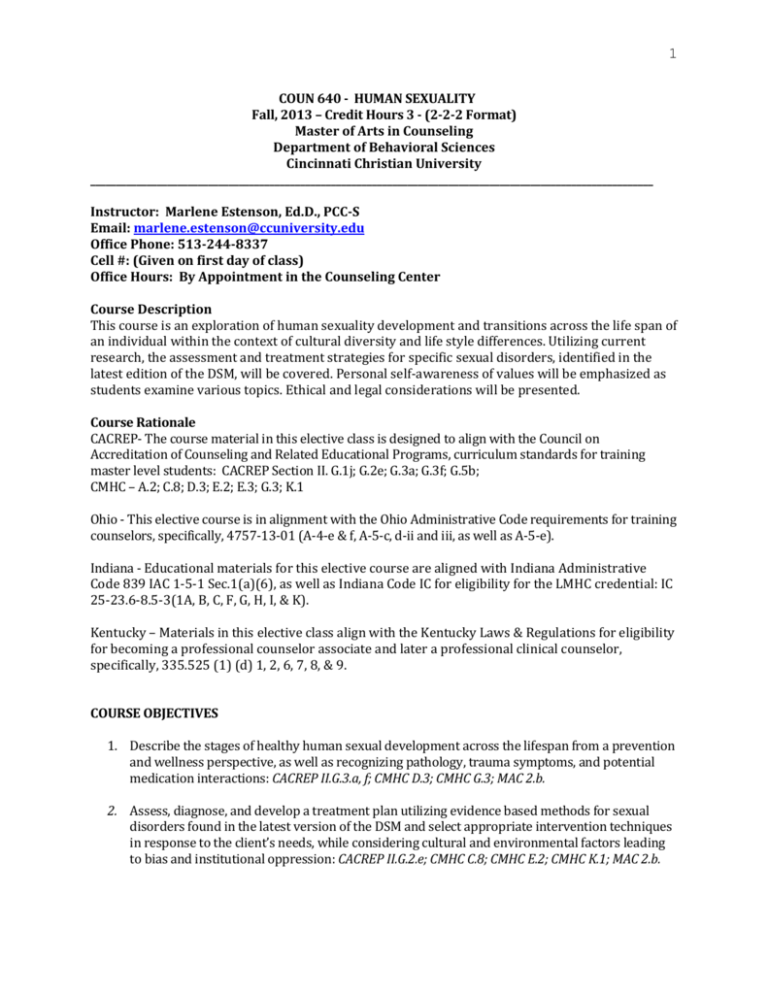
1 COUN 640 - HUMAN SEXUALITY Fall, 2013 – Credit Hours 3 - (2-2-2 Format) Master of Arts in Counseling Department of Behavioral Sciences Cincinnati Christian University ______________________________________________________________________________________________________________ Instructor: Marlene Estenson, Ed.D., PCC-S Email: marlene.estenson@ccuniversity.edu Office Phone: 513-244-8337 Cell #: (Given on first day of class) Office Hours: By Appointment in the Counseling Center Course Description This course is an exploration of human sexuality development and transitions across the life span of an individual within the context of cultural diversity and life style differences. Utilizing current research, the assessment and treatment strategies for specific sexual disorders, identified in the latest edition of the DSM, will be covered. Personal self-awareness of values will be emphasized as students examine various topics. Ethical and legal considerations will be presented. Course Rationale CACREP- The course material in this elective class is designed to align with the Council on Accreditation of Counseling and Related Educational Programs, curriculum standards for training master level students: CACREP Section II. G.1j; G.2e; G.3a; G.3f; G.5b; CMHC – A.2; C.8; D.3; E.2; E.3; G.3; K.1 Ohio - This elective course is in alignment with the Ohio Administrative Code requirements for training counselors, specifically, 4757-13-01 (A-4-e & f, A-5-c, d-ii and iii, as well as A-5-e). Indiana - Educational materials for this elective course are aligned with Indiana Administrative Code 839 IAC 1-5-1 Sec.1(a)(6), as well as Indiana Code IC for eligibility for the LMHC credential: IC 25-23.6-8.5-3(1A, B, C, F, G, H, I, & K). Kentucky – Materials in this elective class align with the Kentucky Laws & Regulations for eligibility for becoming a professional counselor associate and later a professional clinical counselor, specifically, 335.525 (1) (d) 1, 2, 6, 7, 8, & 9. COURSE OBJECTIVES 1. Describe the stages of healthy human sexual development across the lifespan from a prevention and wellness perspective, as well as recognizing pathology, trauma symptoms, and potential medication interactions: CACREP II.G.3.a, f; CMHC D.3; CMHC G.3; MAC 2.b. 2. Assess, diagnose, and develop a treatment plan utilizing evidence based methods for sexual disorders found in the latest version of the DSM and select appropriate intervention techniques in response to the client’s needs, while considering cultural and environmental factors leading to bias and institutional oppression: CACREP II.G.2.e; CMHC C.8; CMHC E.2; CMHC K.1; MAC 2.b. 2 3. Gain awareness of one’s own sexual development and values, as it relates to the role of a professional counselor, in ethically and legally treating a diverse population of individuals with various lifestyles: CACREP II.G.1.j; CACREP II.G.5.b; CMHC A.2; MAC 1. 4. Identify professional organizations and competency standards for various populations and ethically refer individuals to appropriate resources for treatment when outside of their training: CACREP II.G.1.j; CACREP II.G.2.e; CMHC E.3; MAC 2.b. Method of Instruction As graduate counseling students it is expected that you will demonstrate both responsibility and motivation consistent with that of a self-learner and maintain a professional attitude. This class will be taught using a seminar style that encourages collaborative presentations and active participation of each member. Learning will be facilitated via discussion of readings, application to cases, role-plays, videos, and written assignments. Guest speakers may present some of the course material. REQUIRED MATERIALS Moodle and Email All students enrolled in this course are required to check Moodle and their email weekly for the duration of the course. Course announcements, changes to the syllabus, and memos from the instructor will be distributed via Moodle and/or email. Students are responsible for all information distributed in this manner. Required Texts Adams, T. (2011). Narrating the closet: An autoethnography of same-sex attraction. Walnut Creek, CA: Left Coast Press. Heitritter, L., & Vought, J. (2006). Helping victims of sexual abuse: A sensitive biblical guide for counselors, victims, and families. Bloomington, MN: Bethany House. Levine, S. B., Risen, C. B., & Althof, S. E. (Eds.). (2010). Handbook of clinical sexuality for mental health professionals (2nd ed.). New York, NY: Taylor & Francis. Please Note: The text material is selected to meet the Ethical Standards of the American Counseling Association (ACA) and the ethical policies of the State of Ohio Counselor, Social Worker, and Marriage & Family Therapist Board and may not reflect the value system of the instructor or always be in agreement with the spiritual beliefs of CCU. Students are encouraged to integrate their own spiritual beliefs with professional standards as the course material is explored through a Christian perspective. Students will be asked to sign a contract of understanding on the first day of class. Recommended Text American Psychiatric Association. (2013). Diagnostic and statistical manual of mental disorders (5th ed.). Arlington, VA; Author. (During this year of transition from the DSM IV to the DSM – 5, differences in diagnostic criteria for categorization will be discussed.) 3 Grading/Evaluation In accordance with rule 4757-3-01(J)(1) from the Ohio Counselor, Social Worker, and Marriage & Family Therapist Board, you must receive a B- (83%) or higher in this course for it to count toward your MAC degree or licensure. Assignments Points/Percentages 1. Chapter Questions (30% of grade) Read the Handbook of Clinical Sexuality for Mental Health Professionals (2nd ed.). As this is a 2-2-2 course, students will need to begin responding to the questions in a timely manner in order to cover the 480 pages and write their responses to the questions. Specific questions to respond to will be emailed early in the semester so students can begin the assignment. Please limit responses to no more than 300 words for each chapter. No minimum word amount is required, but appropriate effort in reading and reflection should be evident. Responses should be typed with double spacing. APA style is not required for responses to the questions. Due: Questions for Chapters 1 thru 8, 13, and 17 (September 26, 2013 at 10 am) Questions for Chapters 14, 18, 19 thru 21, 24+25 (October 24, 2013 at 10 am) Questions for Chapters 9 thru 12, 15+16, 22+23 (November 21, 2013 at 10 am) Course Objective(s): 1,2,3,4 2. Book Report (10% of grade) Read Helping Victims of Sexual Abuse and write a 3-5 page book report. A brief summary should be included. However, the focus should be on what the student learned, agreed or disagreed with, emotional reaction to the book, and how the material can be utilized with clients. (APA writing style required). Due Date: September 26, 2013 by 10 am Course Objective(s): 1, 2, 3, 4 3. Research/Integration Paper (25% of grade) A 10 page research paper on counseling LGBTQIQ individuals is required. Professional competency standards and specific issues that individuals may face in terms of bias and oppression should be discussed from a systems perspective. Material from reading the Adams book Narrating the Closet should be included. Resources from class such as discussion, film presentation, and material from the guest speaker may be utilized. A portion of the paper should address the student’s self-awareness; showing an integration of understanding of LGBTQ issues, personal values, spiritual issues, environmental factors and the professional role of a counselor. At least 2 additional professional journal references should be included, as well as referencing the appropriate ACA ethical guidelines for treatment. APA style of writing should be utilized. A rubric will be given on the first day of class. Due date: December 3, 2013 Course Objective(s): 1, 2, 3, 4, 4. Class Presentation (10% of grade) Topics will be assigned on the first day of class from the latest version of the DSM addressing specific sexual dysfunctions. Presentations will be made at the December class sessions. Presentations should be original/creative and not consist of only lecture/power point. Be sure to include: - overview of the topic from the text and the DSM - potential referral sources -symptoms criteria and differential diagnostic issues - treatment options - bibliography for all members of the class 4 Note: All films, tapes, speakers, and/or materials to be used must be approved by the Instructor one week prior to the presentation. A rubric will be given out in class on the first day. Due date: November 21, 2013 Course Objective(s): 1, 2, 3, 4 5. Video Assessment Reports (10% of grade) A total of 2 films (approximately one hour each) should be selected from the AACC Human Sexuality Films, on reserve in the library. A worksheet should be completed and submitted with a detailed set of notes attached. Keep a copy for your own records. Due Date: December 3, 2013 Course Objective(s): 1, 2, 3, 4 6. Final Exam (15% of grade) The final will be a take home final consisting of two parts. Part 1 consists of matching specific diagnostic criteria to the accurate diagnosis. Part 2 of the exam will consist of a case study that the students will assess, diagnose, and develop a treatment plan for. A rubric for part 2 of the exam will be given out in class. Due Date: December 3, 2013 Course Objective(s): 1, 2, 3, 4 Important Notes Attendance and Participation Attendance of all 6 days of the 2/2/2 class is expected. Tardiness will be accumulated as an absence. Emergency situations will be individually dealt with, and documentation may be required. All work must be made up by the student by the next class period. Late Assignments The quality of all assignments should be that of a graduate level. Any work that does not meet those standards will have points taken off, and the student will be expected to resubmit the work. Late assignments will be accepted, but there will be a 5% penalty for the assignment per day. This policy will be enforced to encourage students to make their education a priority. Christian Component Throughout this course students will be encouraged to evaluate the material presented from a Christian perspective. All readings, assignments, discussions and lectures will be examined from a Biblical viewpoint as we strive to integrate professional counseling resources. Student Conduct Students may use laptops for note taking purposes only. Students may not use laptops for conducting research, entertainment, web browsing, online conversations, watching movies, emailing or any other activity that distracts. Violations of this policy will result in laptops being prohibited. All cell phones and pagers should be set to silent. Students are permitted to record lectures for their own purposes. Audio or video copies of lecture material are not to be distributed to non-class members without the written permission of the instructor. Accommodations Students who require academic accommodations due to any documented physical, psychological, or learning disability should request assistance from the Academic Support Director, Marie Reeves, within the first two weeks of class. The Academic Support Office is located in the lower level of the 5 Worship and Ministry Building (room 153). You may also contact the office by phone (244-8420). Please inform the Instructor of any needs you may have to ensure a timely and satisfactory response. Academic Dishonesty Cheating or turning in work that is not your own will result in a 0 grade for the assignment. The MAC staff may take additional action. Please, see the MAC Program Handbook for further information on policies regarding plagiarism. Students should not turn in assignments from previous classes to meet current requirements. Ethical Requirements All students are expected to follow the ACA Code of Ethics, AACC Code of Ethics and the State of Ohio rules and regulations, as provided by the Ohio Counselor, Social Worker, Marriage and Family Therapist Board. See the MAC Program Handbook for additional information. Under no circumstances should identifying information about clients ever be used in class. All case studies should refer to general client type situations and avoid specific identifying information. Personal Consideration This class covers instructional material that some will find challenging. Alternative perspectives can lead to reflection that may result in personal and professional growth. If you become distressed about any material/discussions, please talk with the instructor and/or make an appointment to see a counselor. You are responsible for not divulging any personal information that you would not want shared. At the same time you are encouraged to take appropriate risks that could lead to insight and growth. Information shared by other students or guest speakers should be respected and not shared outside of class. Please keep in mind that some of the readings and speakers may challenge your personal belief system. Flexibility Clause This syllabus is NOT a binding contract. The Instructor reserves the right to amend any part of this course syllabus, as deemed necessary, to offer the best possible educational experience for students. All modifications to the syllabus will be announced in class, on Moodle and/or by email. 6 Date/Schedule Session I Day 1 9/26/13 Morning 10 am -12:30 Lunch (12:301:30) Afternoon 1:30-5 COURSE SCHEDULE 2-2-2 Format Topics Introductions (syllabus & contracts) Personal scripts and differences Sexuality defined Historical and cross-cultural perspectives Research issues Professional organizations Anatomy knowledge Sexual development across the life span Wellness and prevention Identifying pathology Body Image issues Presentation sign up Discussion of text questions Assignment/Readings Due Chapters 1 thru 8, 13, and 17 Book Report on Helping Victims of Sexual Abuse Course Objective(s): 1, 2, 3, 4 Session I Day 2 9/27/13 Morning 9 am -12:00 Lunch (12:001:00) Afternoon 1:00-5 Sexual Trauma – System perspective on individual, family, and community Working with children, adolescents and adults Assessment, diagnosing and Treatment Group Facilitating Legal and Ethical issues Discussion of text questions Review of next session Course Objective(s): 1, 2, 3, 4 Session II Day 3 10/24/13 Morning 10 am -12:30 Lunch (12:301:30) Afternoon 1:30-5 Sexual Abuse – Individual and group treatment Evidenced based Interventions Environmental and cultural Considerations Adult and adolescent offenders Treatment Prevention Resources Referral Pornography Sexual Addiction Cycle Discussion of text questions Course Objective(s): 1, 2, 3, 4 Chapters 14, 18, 19 thru 21, 24+25 Narrating the Closet, by Tony Adams 7 Session II Day 4 10/25/13 Morning 9 am -12:00 Lunch (12:001:00) Afternoon 1:00-5 Session III Day 5 11/21/13 Morning 10 am -12:30 Lunch (12:301:30) Afternoon 1:30-5 Session III Day 6 11/22/13 Morning 9 am -12:00 Homosexuality LGBTQ cultural and environmental issues Professional Competencies Guest Speaker Current ACA ethical issues Counselor self-awareness of values Sexuality and physical illness Sexuality and disabilities Aging and sexual issues Discussion of text questions Review of next session Course Objective(s): 1, 2, 3, 4 Birth Control choices and STI’s Counseling the infertile individual/couple Pregnancy issues Conception/Birth Presentation 1, 2, & 3 Paraphillias Desire Disorders Arousal Disorders Chapters 9 thru 12, 15+16, 22+23 Presentations Discussion of text questions Course Objective(s): 1, 2, 3, 4 Presentations 4, 5, 6, 7 Orgasm Disorders Pain Disorders Gender Dysphoria Healthy Sexuality from a Christian Perspective Research/Integration Paper Discussion of text questions Lunch (12:001:00) Afternoon 1:00-5 Presentations Review of the course Evaluation Course Objective(s): 1, 2, 3, 4 Video Assessment Reports - Due Date: December 3, 2013 Final Exam - Due Date: December 3, 2013


